中考英语句型转换解题技巧
上海中考英语句型转换讲解与练习
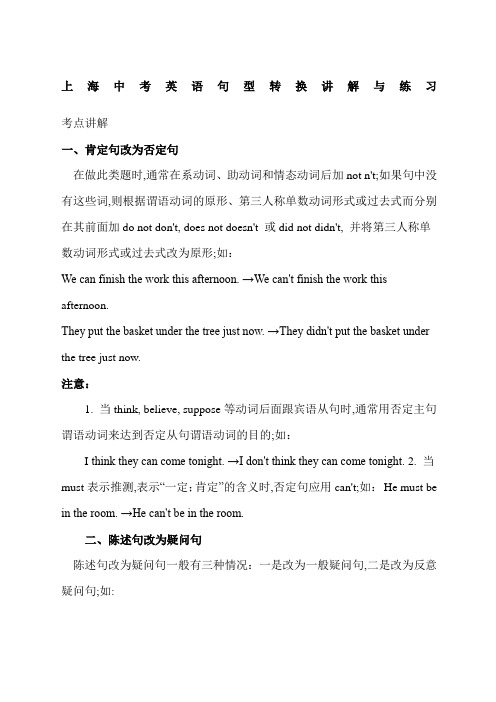
上海中考英语句型转换讲解与练习考点讲解一、肯定句改为否定句在做此类题时,通常在系动词、助动词和情态动词后加not n't;如果句中没有这些词,则根据谓语动词的原形、第三人称单数动词形式或过去式而分别在其前面加do not don't, does not doesn't 或did not didn't, 并将第三人称单数动词形式或过去式改为原形;如:We can finish the work this afternoon. →We can't finish the work this afternoon.They put the basket under the tree just now. →They didn't put the basket under the tree just now.注意:1. 当think, believe, suppose等动词后面跟宾语从句时,通常用否定主句谓语动词来达到否定从句谓语动词的目的;如:I think they can come tonight. →I don't think they can come tonight. 2. 当must表示推测,表示“一定;肯定”的含义时,否定句应用can't;如:He must be in the room. →He can't be in the room.二、陈述句改为疑问句陈述句改为疑问句一般有三种情况:一是改为一般疑问句,二是改为反意疑问句;如:1. The students had learned about 1,000 English words by the end of last term. 改为一般疑问句→Had the students learned about 1,000 English words by the end of last term 2. The twins have never been to the Summer Palace, have they 完成反意疑问句三、对划线部分提问对划线部分提问,就是用一个合适的疑问词去替代句中的某一成分,使之成为一个特殊疑问句;当对主语或主语的定语提问时,用陈述句语序;对定语提问时,所修饰的名词应放在疑问词后;对其他成分提问,用“疑问词+一般疑问句语序”;如:1.Tom will be back in ten days. 对划线部分提问→Who will be back in tendays2. He writes to his father once a month. 对划线部分提问→How oftendoes he write to his father四、同义句改写1.根据句意改写主要考查学生对句意的理解和用一个词或一种结构来概括上句的意思的综合能力;如:1. Li Hua and Zhang Ming are the same age.Li Hua is _________ _________ _________ Zhang Ming.答案as old / young as;第一句的意思是“李华和张明同岁”,第二句是说“李华和张明年纪一样大”;2. How many people live in France_________ _________ the population of France答案What is;第一句的意思是“法国有多少人”第二句的意思是“法国的人口有多少”3. The runner fell behind the others though he did what he could. The runner_________ to keep up with the others though he _________ his _________.答案failed; tried; best;第一句意思是:虽然这名赛跑选手尽了全力,但还是落在了别人的后面;第二句的意思是:虽然这名赛跑选手尽了全力,但还是跟不上别人;4. Before talking, he told me his name and I told him my name . We_________ _________ _________ _________ before talking.答案told each other’s names;第一句意思是:谈话前,他告诉了我他的名字,我也告诉他我的名字;第二句的意思是:谈话前,我们相互告知了对方的名字;5. She has been away from Shanghai for over one year.More than one year has _________ since she _________ Shanghai.答案passed; left;第一句的意思是:她离开上海已经一年多了;第二句的意思是:自从她离开上海,一年多已经过去了;6. Walk along the street, then take the third crossing on the right.Walk downthe street, then _________ _________ at the third crossing.答案turn right;两句都是告知他人去某地的路线的常用语,其句意都是:沿着这条街走,然后在第三个拐弯处右转;2.利用从句改写即运用关系代词、关系副词或从属连词改写;如:1. The man is talking with a lady. He gave us a talk last week.The man _________ gave us a talk last week _________ _________ with a lady.答案who / that; is talking;定语从句who / that gave us a talk last week修饰先行词the man;2. He didn’t want to miss the first bus, so he got up early.He got up early _________ _________ he could catch the first bus.答案so that;目的状语从句so that he could catch the first bus说明动词got up early的目的;3. “Did you sleep well last night ” David asked her.David asked her _________ _________ _________ well last night.答案if / whether she slept;直接引语转换成间接引语时,如果直接引语是一般疑问句时,连接词要用if或whether,句子保持陈述句的语序;4. Come on, or we’ll miss the early bus._________ we _________ hurry, we’ll miss the early bus.答案If; don’ t;if 引导条件状语从句;句意为:如果我们还不快一点,我们就赶不上头班车了;祈使句与条件状语从句的相互转换5. John will go to bed after he finished his homework.John _________ to bed _________ he finished his homework.答案didn’t; until;not…until表示“直到……才”的意思;3.利用so do I改写“so+动词+主语”结构,表示肯定,译为“某人物也如此”;“neither/nor +动词+主语”结构表示否定, 译为“某人物也不……”;这两种结构指前一句所说的情况同样也适合另一个人或物;转换时应注意四点:1.动词指助动词、be动词或情态动词;2.动词在时态上与前句呼应;3.动词在数上要与本句主语保持一致;4.表示否定时,neither/nor本身具有否定意义,动词要用肯定形式;1. Jim wants to go boating and his parents want to go boating, too. Jim wants to go boating, and _________ _________ his parents.答案so do;主语是复数his parents, 时态是一般现在时,助动词do;2.I like playing tennis. He likes playing tennis, too.I like playing tennis, _________ _________ he.答案so does;主语是第三人称单数,时态是一般现在时,助动词用does;4.利用连词改写运用关联连词组both...and, neither...nor, either...or, not only...but also, as well as等,可将并列句或两个句子合并为一个简单句,注意neither...nor, either...or, not only...but also作主语时,谓语动词遵循就近原则;1. Lucy can’t sing the English song Yesterday Once More. And Lily can’t sing it, either._________ Lucy_________ Lily can sing the English song Yesterday Once More.答案Neither; nor;neither...nor表示“两者都不”;2. My father isn’t a history teacher. My mother isn’t a history teacher, either._________ my father _________ my mother _________ a history teacher.答案Neither; nor; is;neither …nor… 作句子的主语时,谓语动词遵循“就近原则”,与最邻近的那个名词或代词保持数的一致;3.Alice has seen the film twice. Sandy has seen it twice, too. _________Alice_________ Sandy have seen the film twice.答案Both; and;both…and 表示“两者都”;4. This store sells men’s shoes, and it also sells men’s clothes.This store sells _________ _________ men’s shoes _________ _________ men’s clothes.答案not only; but also;not only...but also示“不仅……而且”之意;5.利用介词短语改写1. We have friends in the whole world.Our friends are _________ _________ the world.答案all over;固定词组all over表示“遍及”之意;2. It’s a long time since we met last.We haven’t seen each other _________ _________.答案for long;for long意为“很长一段时间”;3. He walks to school every day.He goes to school _________ _________ every day.答案on foot;固定词组on foot意为“步行”;4.Tom had no time for breakfast. He went to school in a hurry.Tom _________ to school _________ breakfast.答案went; without;介词without有“没有,不带”之意;5. I met one of my friends when I was going to the museum._________ _________ _________ to the museum I met an old friend of mine. 答案On my way;介词短语on one’s way to… 表示“在某人去……的路上意思;6.利用不定式改写1. The foreigners want to know how they can learn Chinese Kongfu well. The foreigners want to know _________ _________ learn Chinese Kongfu well.答案how to;不定式与特殊疑问词what, when, where, how, which, whether连用构成不定式复合结构,在句中作主语、宾语、表语、宾语补足语等;2. She was so weak that she couldn’t take care of her baby. She was_________ weak _________ take care of her baby.答案too; to;原句意思是:她身体太弱,不能照顾孩子;too…to … 句型表示“太……以致于不能……”之意;3. She seems to be worried now._________ _________ that she _________ worried now.答案It seems; is;固定句型It seems / seemed that sb… 可替换成sb seems / seemed to …,表示“某人看起来……”;5.He was so happy that he couldn’t say a word when he was told the news.He was _________ happy _________ say a word when he was told the news.答案too; to;too…to… 表示“太……而不能……”之意;5. The ice on the lake was so thin that people couldn’t skate on it.The ice on the lake was not _________ enough _________people _________ _________ _________ it.答案thick; for; to skate on;形容词或副词+enough +to do sth,意为“足够……以致于能够……”,用来替换“so…that+结果状语从句”;6. In China we build the Great Green Wall so that the wind won’t blow the earth away.In China we build the Great Green Wall _________ _________ __________________ _________ _________ the earth away.答案to stop the wind from blowing;不定式作目的状语;7.利用时态改写中考同义句改写中涉及的时态间的相互转换主要是针对一般过去时与现在完成时两种时态间的转换而言的,应特别注意非延续性动词的用法;如:1. The film began 20 minutes ago.The film has been _________ _________ 20 minutes.答案on for;短暂动词begin,在此意为“电影开始放映、上演”,不能与延续时间状语连用,与延续性时间状语连用时,将begin 改成be up;has been提示时态是现在完成时态, “for+时间段” 表示“持续一段时间”,常用在含有现在完成时态的句子里;摘自中考英语网2. Sam’s grandfather died 10 years ago.Sam’s grandfather has been _________ _________ 10 years.答案dead for;短暂动词die,意为“死亡”,不能与延续性时间状语连用,与延续性时间状语连用时,将短暂动词die改为be dead;3. My grandpa joined the Party thirty years ago.My grandpa _________ _________ _________ the Party for thirty years. 答案has been in;短暂动词join,意为“加入组织,政党”,不能与延续性时间状语连用,与延续性时间状语连用时,将join 改成be in 或be a member in…;”4. I got up half an hour ago.I _________ _________ up for half an hour.答案have been;短暂动词get up,意为“起床”,不能与延续时间状语连用,与延续性时间状语连用时,将get up 改成be up;5. Three years has passed since the students came to this school. The students have _________ _________ this school for three years.答案been in;与原句意思一致,“学生在这所学校里已3年了”;8.利用语态改写通过改变主语,主动语态与被动语态之间可进行同义句转换,特别要注意时态、情态动词的用法;如:1. People grow rice in the south of China.Rice_________ _________ in the south of China.答案is grown;rice作主语,助动词用一般现在时的单数形式is;2. Everyone should give back his library books on time. Library books should _________ _________ on time.答案be given back;被动句中含有情态动词should,因此助动词用be;3. It is widely accepted that more people use computers in the world today. Computers _________ widely _________ in the world today.答案are; used;computers是复数名词作主语,助动词用are,且句子用被动; 4. We must keep the noise level under 50dbs分贝.The noise level must _________ _________ under 50dbs.答案be kept;被动句中含情态动词must,因此助动词用be;5. Do they grow rice in autumn _____ rice_____ in autumn答案Is; grown;不可数名词rice作主语, 助动词用单数is,一般疑问句的助动词置于句首;6. We call maths the language of science.Maths _________ _________ the language of science.答案is called;主语maths虽然是以s结尾,但并不是名词的复数,因此助动词仍用单数is;9.利用反义词改写用反义词或词组加上否定词表达与原句相同的意思,主要考查学生对反义词、词组的积累和换位思维的能力;如:1. The boy lent a story-book to Tom just now.Tom _________ a story-book _________ the boy just now.答案borrowed; from;borrow…from意为“从……借来”;而lend…to意为“向……借出”,两个词组正好为一组反义词组,当句子的主语变化时,两个词组可以进行互换;2. The factory is not far from here. It only takes you ten minutes by bike. The factory is _________here. I t’s only ten minutes’_________.答案near; bike-ride;not far的意思是“不远,近”,可用形容词near与之转换;3. I think music is less interesting than P.E.I _________think music is _________interesting than P.E.答案don’t; more;less interesting的意思是“没有/ 不及……有趣”,与之相反more interesting的意思是“比……更有趣”; 语言现象“否定的转移”要求将think后面宾语从句中的否定形式转移到think 上;4. The bike under the tree is different from this one.The bike under the tree isn’t the _________ _________this one.答案same as;the same as意为“与……相同”,而反义词组be different from意为“与……不同”;10.利用同义词改写用同义词或同义词组对原句中的某些词或词组进行替换,注意替换后的词或词组的词形变化要与句子其他成分相适应;如:1. They could see icebergs here and there.They could see icebergs _________.答案everywhere;everywhere与here and there都有“到处”之意;2. Mrs Green always takes good care of the children in the school.Mrs Green always _________ _________ the children well in the school.答案looks after;take good care of 与look after…well都有“好好照顾”之意;3. Lin Tao is good at physics.Lin Tao_________ _________ in physics.答案does well;be good at与do well in都有“在……方面做得好,擅长于……”之意;4. I like Backstreet Boys. But he likes F4 better. He_________ F4_________ Backstreet Boys.答案prefers, to;词组prefer A to B 意为“选择A而不选择B;比起B 来,更喜欢A”;5. Mother is ill. Send for a doctor right away.Mother is ill. Send for a doctor _________ _________. 答案at once;right away与at once 都有“马上”之意;6. They enjoyed themselves at the garden party.They _________ _________ _________ _________ at the garden party.答案had a good time;enjoy oneself同have a good time都有“玩得很高兴,愉快”之意;配套练习1. How can we stop him from smokingHow can we ____________ him ____________ smoking2. I want to know who is going to take charge of this project.I wander who is going to be_________ _________ this project.3. The old lady was surprised at the great changes in our city.The old lady was ________ ________ the great changes in our city.4. Mr. Wang took us to visit the new school.Mr. Wang ________ us _________ the new school.6.Wang Hai likes playing football. I like playing football, too.________ Wang Hai ________ I __________ playing football.Wang Hai likes playing football. ________ _______ I._______ _______Wang Hai _______ ______I _______ playing football6. Mr. Gray didn’t go to Beijing yesterday. His wife didn’t go there, either. _______ Mr. Gray _______ his wife _______ to Beijing yesterday.Mr. Gray didn’t go to Beijing yesterday. _______ _______ his wife.7. Jack managed to swim across the river last Friday.Jack ________ in ________ across the river last Friday.8. Writing the world-famous works cost his whole life.He _______ his whole life _______ _______ the world-famous works.9. We are pleased that Tom told us the truth.We are ple ased ________ Tom’s _________.10. It will take Lee Hua half an hour to get the answer to the maths problem.It will take Lee Hua half an hour to _______ _______ the maths problem. 11. I don’t know when we will start.I _______ ______ ______ when we will start.12. I didn’t catch the first bus this morning.I _______ _______ _______ catch the first bus this morning.I _______ _______ catch the first bus this morning.13. This classroom is as large as ours.This classroom is _______ _______ ________ _______ ours.14. We didn’t need chemistry teachers last term.We were _______ _______ _______ of chemistry teachers last term. 15. Mary’s brother has stopped smoking.Mary’s brother has _______ _______ smoking.16. We haven’t decided where to have the meeting.We haven’t decided _______ the ______ to have the meeting.17. The oranges are so expensive that neither of us can buy any.The oranges are too expensive ________ ________ of us to buy.18. I will say sorry to Mr. Lee for being late.I will ________ ________ Mr. Lee for being late.19. Since everyone is here, let’s begin our class._______ _______ everyone is here, let’s begin our class.20. Cheng Ying has a nice watch.Cheng Ying is the ________ ________ the nice watch.Cheng Ying has a nice watch _______ _______ ________.The nice watch ________ ________ Cheng Ying.21. Everybody in our class did his best to help her as she was very poor in her studies.Everybody in our class did ______ ______ ______ to help her _______ her studies.22. We are given the freedom to wear anything we want to school.We are _______ to wear _______ we want to school.23. Peter didn’t have supper and hurried to the night school by bike tonight.Peter ________ to the night school ________ ________ having supper tonight.24. The story happened in a small village.The story _______ _______ in a small village.25. If she doesn’t spend more time on studying, she will never have good grades._______ she _______ more time on studying, she will never have good grades.26. Tom likes watching TV better than listening to the radio.Tom _________ watching TV _______ listening to the radio.27. He spent three hundred yuan buying the new bike.The new bike _______ ________ three hundred yuan .He _______ three hundred yuan ________ the new bike.28. Guangzhou lies in the south of China.Guangzhou ________ ________ in the south of China.29. Smoking is bad for your health.Smoking is ________ ________ your health.30. He went to bed after he had finished his homework.He ________ go to bed _________ he had finished his homework.31. My brother enjoys sports and recreation.My brother ________ ________ ________ sports and recreation.32. To his great joy, he met his old friend in the street._______ ______ ______ ______ meet his old friend in the street.33. How do you like the performance______ do you ______ ______ the performance34. He will say goodbye to his uncle at the airport tomorrow.He will _______ his uncle ________ at the airport tomorrow.35. Have you prepared for your maths examHave you ________ _________ for your maths exam36. Wang Fang hasn’t received a letter from her parents for a long time. Wang Fang’s parents haven’t ________ ________ her for a long time.37. He got up early and went to school on foot.He ________ ________ get up early and ________ to school.38. We all enjoyed the dinner and the beautiful evening, too.We all enjoyed the dinner and the beautiful evening _______ _______. 39. Tom was very interested in science when he was an eight-year-old boy.Tom ________ great ________ in science ________ the ________ of eight.40. The green apple is too hard for your granny to eat.The green apple is _______ hard _______ your granny ________ eat it. The green apple isn’t ________ _______ ________ your granny to eat. 41. Which camp are you going to sign up forWhich camp are you going to _______ _______42. The teacher told the girl not to worry.The teacher told the girl to ________ _______ _______.43. You must review English tonight.You must ________ ________ English tonight.44. You mustn’t throw the waste paper on the floor.You _______ ______ _______ throw the waste paper on the floor.45. Would you like me to tell you about it _________ ________ tell you about it46. They had a wonderful time in the park last Sunday.They __________ __________ in the park last Sunday. __ waste paper on the ground.47. We have different sizes of sports shoes.Our sports shoes come _________ _________ _________.48. He left Nanjing two years ago.He _______ ________ ________ from Nanjing _______ two years. 49. He didn’t tell us anything about it.He ________ us ________ about it.50. You aren’t allowed to throw waste paper on the ground.________ ________ waste paper on the ground.51. I don’t know which oranges to choose.I don’t know _________ oranges _______ _______ choose.52. Shall we take the escalator to the first floor nowWhat ________ ________ the escalator to the first floor now53. He got up even earlier so that he could catch the first bus.He got up even earlier ________ _______ _______ catch the first bus. 54. I’m sure he’ll come to our school this afternoon.I’m sure ________ ________ coming to our school this afternoon.55. Shall we have our class meeting this afternoon_________ have our class meeting this afternoon, _______ _______56. Will you play games with us_________ play games with us, ________ ________57. I haven’t finished reading the book, so I will renew it.I will renew the book ________ I ________ finished reading it.58. He doesn’t learn Japanese now.He _______ ______ ______ _______Japanese.59. The dirty water will be cleaned so that it will not pollute the river nearby.The dirty water will be cleaned _____ _____ _____ _____ pollute the river nearby.60. If you work harder, you’ll hake more progress.________ ________, _________ you’ll make more progress.The _______ you work, the _________ progress you’ll make.61. The customer was pleased with the waiter’s good service, so h e left a tip.A tip _______ _______ to the waiter _________ _________ his good service.62. Where does he come from Tom doesn’t know it.Tom doesn’t know _______ ________ _________ ________.63. Smoking is harmful not only to others but also to myself.Smoking is harmful to myself _______ _______ ________ to others. 64. There are forty students in our class. Twenty are boys, the others are girls.There are forty students in our class. Twenty are boys, _______ ________ are girls.65. He didn’t play football. He went to see the film.He went to see the film ________ ________ _________ football.66. They didn’t miss the 7:45 train last Sunday.They _______ ________ catch the 7:45 train last Sunday.67. There are twenty classes in our school. There are twenty classes in their school, too.There are ________ ________ classes in our school ________ in theirs.68. It is fine today.________ ________ ________ it is today69. They didn’t stop climbing though they were all very tired.They _______ ________ though they were all very tired.70. To answer this question is difficult for me.________ difficult ________ me ________ answer this question.71. Betty won’t a gree with me, I think.I _________ think Betty _________ agree with me.72. A plane goes faster than a taxi.A taxi ________ go _______ fast _________ a plane.73. Mary works very hard at school. Her teacher often praises her. Mary is often praised ________ her hard _________.74. There is something wrong with his bike.________ _______ _______ ________ his bike.75. The doctor didn’t start the operation until the room was bright enough The doctor started ________ _________ there was ________ _______ in the room.76. Alice borrowed a bike from Jane yesterday.Jane ________ a bike _______ Alice yesterday.77. She is so kind.That’s ________ _______ ________ her.78. Nothing is in the box. There is only a card.There is ________ ________ a card in the box.79. His father is teacher. His mother is a teacher, too.His _______ are ________ teachers. ________ of his ________ are teachers.80. I want to speak to her after school.I want to _______ _______ _______ ________ her after school.81. John is as old as Tom.John is the _______ _______ ________ Tom.John and Tom were _______ in the _______ _______.82. How do you lik e Mr. Wang’s garden________ do you _______ ________ Mr. Wang’s garden________ _________ Mr. Wang’s garden_______ Mr. Wang’s garden _________83. We are going to take part in the game.We are going to _______ ______ the game.84. I’ve booked a table for eight at that restaurant ahead of time.I’ve booked a table for eight at that restaurant ________ _______.85. They will go to see Mr. Lee if they are free tomorrow.They will ________ Mr. Lee if they _______ ________ tomorrow.86. Millions of people died in the last war.Millions of people ________ ________ ________ in the last war.87. Can you pass me a knifeWould you _______ _______ me a knife 88. This bike is 400 yuan. That bike is 500 yuan.That bike is ________ _______ than his one.This bike is ________ _______ than that one.89. My father joined the Party ten years ago.My father _______ _______ ________ Party member for ten years. My father _______ _______ ________ the Party for ten years.90. His brother bought a new bike a month ago.His brother _______ _______ a new bike for a month.91. Terry is more diligent than any other student in her class._______ all the _______, the _______ ________ student is Terry.92. Mary and Jane didn’t go to bed until midnight, talking about their future. Mary and Jane _______ _______ until midnight, talking about their future. 93. Bell had a keen desire to help the deaf. Bell _______ _______ to help the deaf.94. My father went to Japan in 1996 and 1998.My father _______ already _______ to Japan ________.95. All of us get up early in the morning.________ of us gets up ________ in the morning.96. Switzerland has many mountains regions. They are excellent for skiing. Switzerland has many mountains regions________ ________ excellent for skiing.97. The DVD has taken the place of VCD in my home town.The DVD _______ ________ _________ instead of VCD in my home town.98. After a quick breakfast, Mary left in a hurry.After a quick breakfast, Mary ________ ________.99. The boy asked his mother, “Does water freeze at 0 C ”The boy asked his mother ________ water _________ at 0 C.100. In some states of America, children must stay in school until they are sixteen. In some states of America, children ______ ______ school until they are sixteen.1. prevent … from2. responsible for3. amazed at.4. showed … around5. Both … and … like So do I Not only … but also6. Neither … nor… went Neither/Nor did.7. succeeded … swimming8. spent … in writing9. with … honesty. 10.work out 11. have no idea12. wasn’t able to; failed to13. the same size as. 14. in no need 15. given up.16. on … place. 17. for either18. I will apologize to Mr. Lee for being late.19. Now that everyone is here, let’s begin our class.20. Cheng Ying owns a nice watch.Cheng Ying is the owner of the nice watch.Cheng Ying has a nice watch of her own.The nice watch belongs to Cheng Ying.21. Everybody in our class did what he could to help her with her studies. 22. We are free to wear whatever we want to school.23. Peter rode to the night school hurriedly without having supper tonight. 24. The story took place in a small village.25. Unless she spends more time on studying, she will never have good grades.26. Tom prefers watching TV to listening to the radio.27. The new bike cost him three hundred yuan . He paid three hundred yuan for the new bike.28. Guangzhou is located in the south of China.29. Smoking is harmful to your health.30. He didn’t go to bed until he had finished his homework.31. My brother is interested in sports and recreation.32. He was happy to meet his old friend in the street.33. What do you think of the performance34. He will see his uncle off at the airport tomorrow.35. Have you got ready for your maths exam36. Wang Fang’s parents haven’t written to her for a long time.37. He used to get up early and walked to school.38. We all enjoyed the dinner and the beautiful evening as well.39. Tom showed great interest in science at the age of eight.40The green apple is so hard that your granny can’t eat it.The green apple isn’t soft enough for your granny to eat.41. Which camp are you going to enter for42. The teacher told the girl to take it easy.43. You must go over English tonight.44. You aren’t allowed to throw the waste paper on the floor.45. Shall I tell you about it46. They enjoyed themselves in the park last Sunday.47. Our sports shoes come in all sizes.48. He has been away from Nanjing for two years.49. He told us nothing about it.50. Don’t litter waste paper on the ground.51. I don’t know which oranges I should choose52. What about taking the escalator to the first floor now53. He got up even earlier in order to catch the first bus.54. I’m sure of his coming to our school this afternoon.55. Let’s have our class meeting this afternoon, shall we56. Please play games with us, will you57. I will renew the book because I haven’t finished reading it.58. He has given up learning Japanese.59. The dirty water will be cleaned so as not to pollute the river nearby.60. Work harder, and you’ll make more progress.The harder you work, the more progress you’ll make.61. A tip was left to the waiter because of his good service.62. Tom doesn’t know where he comes from.63. Smoking is harmful to myself as well as to others.64. There are forty students in our class. Twenty are boys, the rest are girls.65. He went to see the film instead of playing football.66. They managed to catch the 7:45 train last Sunday.67. There are as many cclasses in our school as in theirs.68. What fine weather it is today69. They kept climbing though they were all very tired.70. It’s difficult for me to answer this question.71. I don’t think Betty will agree with me.72. A taxi doesn’t go as/so fast as a plane.73. Mary is often praised for her hard work.74. Something is wrong with his bike.75. The doctor started operating when there was enough light in the room. 76. Jane lent a bike to Alice yesterday.77. That’s very kind of her.78. There is nothing but/except a card in the box.79. His parents are both teachers. Both of his parents are teachers.80. I want to have a word/talk with her after school.81. John is the same age as Tom.John and Tom were born/both in the same year.82. What do you think of Mr. Wang’s garden What about Mr. Wang’s garden What’s Mr. Wang’s garden like83. We are going to join in the game.84. I’ve booked a table for eight at that restaurant in advance.85. They will visit Mr. Lee if they have time / aren’t busy tomorrow.86. Millions of people lost their lives in the last war.87. Would you mind passing me a knife88. That bike is more expensive than his one. This bike is much cheaper than that one.89. My father has been a Party member for ten years. My father has been in the Party for ten years.90. His brother has had a new bike for a month.91. Of all the students, the most diligent student is Terry.92. Mary and Jane stayed up until midnight, talking about their future.93. Bell was eager to help the deaf.94. My father has already been to Japan twice.95. None of us gets up late in the morning.96. Switzerland has many mountains regions that/which are excellent for skiing.97. The DVD has been used instead of VCD in my home town.98. After a quick breakfast, Mary hurried off / left hurriedly / hurried away.99. The boy asked his mother if water freezes at 0 C.100. In some states of America, children mustn’t/can’t leave school until they are sixteen。
中考英语句型转换
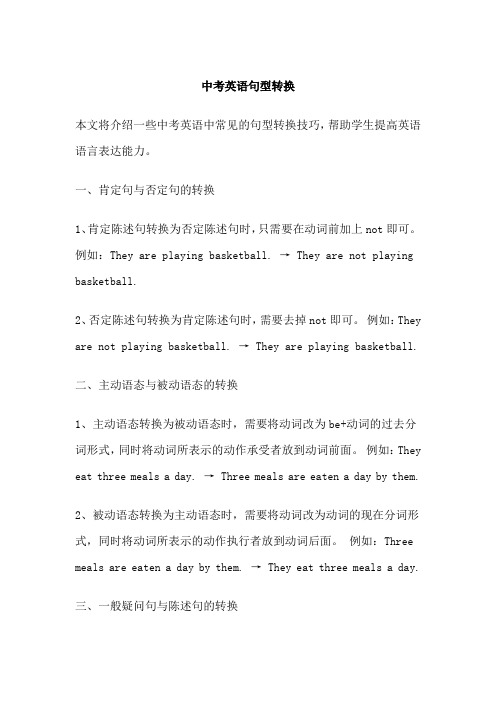
中考英语句型转换本文将介绍一些中考英语中常见的句型转换技巧,帮助学生提高英语语言表达能力。
一、肯定句与否定句的转换1、肯定陈述句转换为否定陈述句时,只需要在动词前加上not即可。
例如:They are playing basketball. → They are not playing basketball.2、否定陈述句转换为肯定陈述句时,需要去掉not即可。
例如:They are not playing basketball. → They are playing basketball.二、主动语态与被动语态的转换1、主动语态转换为被动语态时,需要将动词改为be+动词的过去分词形式,同时将动词所表示的动作承受者放到动词前面。
例如:They eat three meals a day. → Three meals are eaten a day by them.2、被动语态转换为主动语态时,需要将动词改为动词的现在分词形式,同时将动词所表示的动作执行者放到动词后面。
例如:Three meals are eaten a day by them. → They eat three meals a day.三、一般疑问句与陈述句的转换1、一般疑问句转换为陈述句时,需要将动词改为相应的陈述语气,同时将主语放到动词后面。
例如:Are they playing basketball? →They are playing basketball.2、陈述句转换为一般疑问句时,需要将动词改为一般疑问语气,同时将主语放到动词前面。
例如:They are playing basketball. →Are they playing basketball?四、时间状语从句的转换1、现在时态的时间状语从句转换为过去时态的时间状语从句时,需要将动词改为过去时态。
例如:I will go to the park tomorrow. → I went to the park yesterday.2、过去时态的时间状语从句转换为现在时态的时间状语从句时,需要将动词改为现在时态。
英语句型转换必备
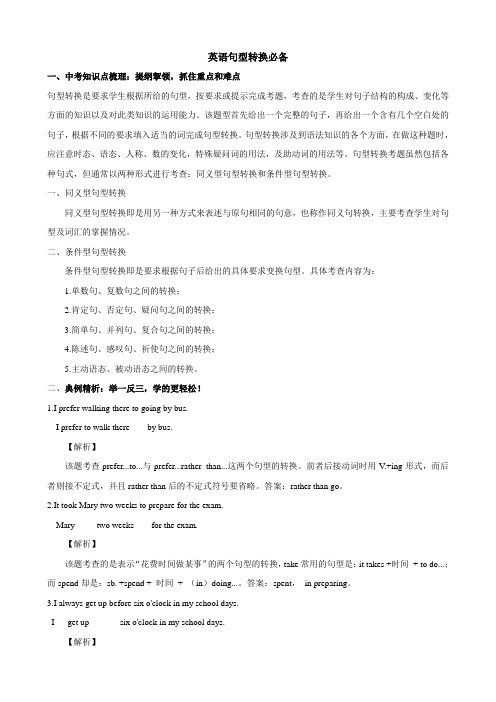
英语句型转换必备一、中考知识点梳理:提纲挈领,抓住重点和难点句型转换是要求学生根据所给的句型,按要求或提示完成考题,考查的是学生对句子结构的构成、变化等方面的知识以及对此类知识的运用能力。
该题型首先给出一个完整的句子,再给出一个含有几个空白处的句子,根据不同的要求填入适当的词完成句型转换。
句型转换涉及到语法知识的各个方面,在做这种题时,应注意时态、语态、人称、数的变化,特殊疑问词的用法,及助动词的用法等。
句型转换考题虽然包括各种句式,但通常以两种形式进行考查:同义型句型转换和条件型句型转换。
一、同义型句型转换同义型句型转换即是用另一种方式来表述与原句相同的句意,也称作同义句转换,主要考查学生对句型及词汇的掌握情况。
二、条件型句型转换条件型句型转换即是要求根据句子后给出的具体要求变换句型。
具体考查内容为:1.单数句、复数句之间的转换;2.肯定句、否定句、疑问句之间的转换;3.简单句、并列句、复合句之间的转换;4.陈述句、感叹句、祈使句之间的转换;5.主动语态、被动语态之间的转换。
二、典例精析:举一反三,学的更轻松!1.I prefer walking there to going by bus.I prefer to walk there ___ by bus.【解析】该题考查prefer...to...与prefer...rather than...这两个句型的转换。
前者后接动词时用V.+ing形式,而后者则接不定式,并且rather than后的不定式符号要省略。
答案:rather than go。
2.It took Mary two weeks to prepare for the exam.Mary ____ two weeks ___ for the exam.【解析】该题考查的是表示“花费时间做某事”的两个句型的转换,take常用的句型是:it takes +时间+ to do...;而spend却是:sb. +spend + 时间+ (in)doing...。
中考英语句型转换典型例题及详解
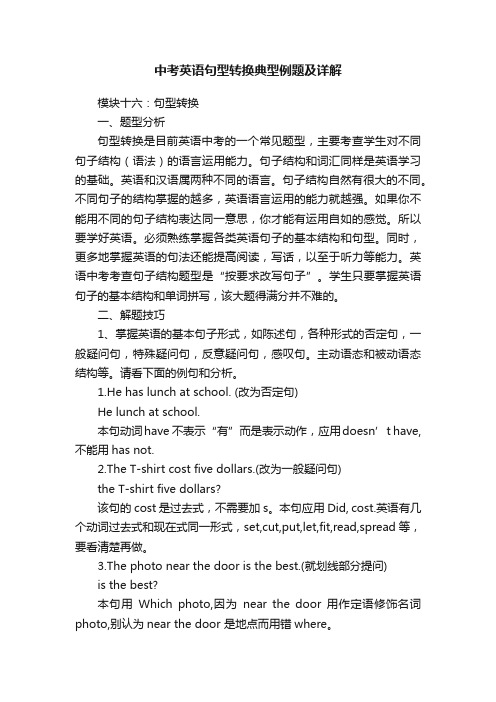
中考英语句型转换典型例题及详解模块十六:句型转换一、题型分析句型转换是目前英语中考的一个常见题型,主要考查学生对不同句子结构(语法)的语言运用能力。
句子结构和词汇同样是英语学习的基础。
英语和汉语属两种不同的语言。
句子结构自然有很大的不同。
不同句子的结构掌握的越多,英语语言运用的能力就越强。
如果你不能用不同的句子结构表达同一意思,你才能有运用自如的感觉。
所以要学好英语。
必须熟练掌握各类英语句子的基本结构和句型。
同时,更多地掌握英语的句法还能提高阅读,写话,以至于听力等能力。
英语中考考查句子结构题型是“按要求改写句子”。
学生只要掌握英语句子的基本结构和单词拼写,该大题得满分并不难的。
二、解题技巧1、掌握英语的基本句子形式,如陈述句,各种形式的否定句,一般疑问句,特殊疑问句,反意疑问句,感叹句。
主动语态和被动语态结构等。
请看下面的例句和分析。
1.He has lunch at school. (改为否定句)He lunch at school.本句动词have 不表示“有”而是表示动作,应用doesn’t have,不能用has not.2.The T-shirt cost five dollars.(改为一般疑问句)the T-shirt five dollars?该句的cost 是过去式,不需要加s。
本句应用Did, cost.英语有几个动词过去式和现在式同一形式,set,cut,put,let,fit,read,spread等,要看清楚再做。
3.The photo near the door is the best.(就划线部分提问)is the best?本句用Which photo,因为near the door 用作定语修饰名词photo,别认为near the door 是地点而用错where。
4.We have studied in this school for four years,(改为特殊疑问句)have you studied in this school?本句虽没有划线部分,但根据句子其他部分意思,可以看出是对for four years 进行提问,肯定用How long.5. Let’s go to the exhibition this afternoon.(改为反义疑问句)Let’s go to the exhibition this afternoon,?6.He could hardly see the words on the blackboard. (改为反义疑问句)He could hardly see the words on the blackboard, ?祈使句的反义疑问句,仅Let’s…句型用shall we,其他都用will you. 而一般疑问句改反义疑问句应注意,若句子的主要部分用肯定,附加部分用否定,反之则相反。
初中英语“句型转换”题归类与指导(一)
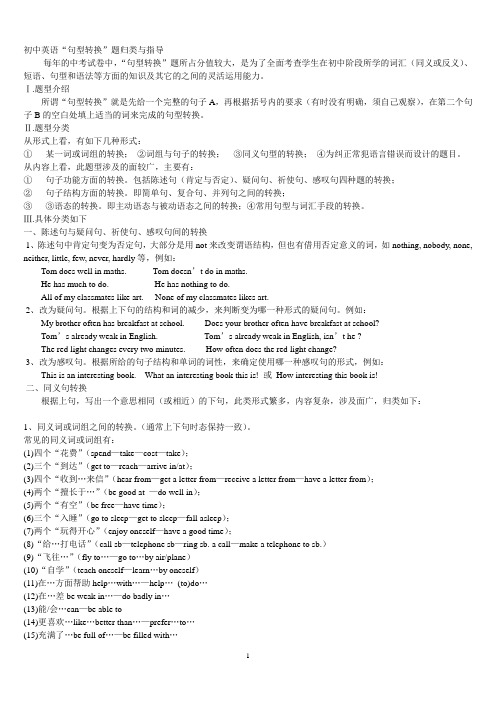
初中英语“句型转换”题归类与指导每年的中考试卷中,“句型转换”题所占分值较大,是为了全面考查学生在初中阶段所学的词汇(同义或反义)、短语、句型和语法等方面的知识及其它的之间的灵活运用能力。
Ⅰ.题型介绍所谓“句型转换”就是先给一个完整的句子A,再根据括号内的要求(有时没有明确,须自己观察),在第二个句子B的空白处填上适当的词来完成的句型转换。
Ⅱ.题型分类从形式上看,有如下几种形式:①某一词或词组的转换;②词组与句子的转换;③同义句型的转换;④为纠正常犯语言错误而设计的题目。
从内容上看,此题型涉及的面较广,主要有:①句子功能方面的转换。
包括陈述句(肯定与否定)、疑问句、祈使句、感叹句四种题的转换;②句子结构方面的转换。
即简单句、复合句、并列句之间的转换;③③语态的转换。
即主动语态与被动语态之间的转换;④常用句型与词汇手段的转换。
Ⅲ.具体分类如下一、陈述句与疑问句、祈使句、感叹句间的转换1、陈述句中肯定句变为否定句,大部分是用not来改变谓语结构,但也有借用否定意义的词,如nothing, nobody, none, neither, little, few, never, hardly等,例如:Tom does well in maths.---------Tom doesn’t do in maths.He has much to do. ---------------He has nothing to do.All of my classmates like art.----None of my classmates likes art.2、改为疑问句。
根据上下句的结构和词的减少,来判断变为哪一种形式的疑问句。
例如:My brother often has breakfast at school.-------Does your brother often have breakfast at school?Tom’s already weak in English.----------------Tom’s already weak in English, isn’t he ?The red light changes every two minutes.-------How often does the red light change?3、改为感叹句。
2023年上海中考英语热点重难点专练重难点17 句型转换解题技巧(原卷版)
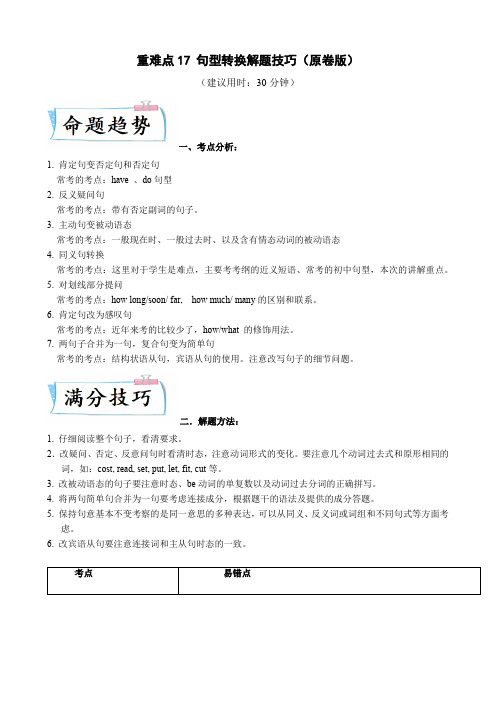
重难点17 句型转换解题技巧(原卷版)(建议用时:30分钟)一、考点分析:1. 肯定句变否定句和否定句常考的考点:have 、do句型2. 反义疑问句常考的考点:带有否定副词的句子。
3. 主动句变被动语态常考的考点:一般现在时、一般过去时、以及含有情态动词的被动语态4. 同义句转换常考的考点:这里对于学生是难点,主要考考纲的近义短语、常考的初中句型,本次的讲解重点。
5. 对划线部分提问常考的考点:how long/soon/ far, how much/ many的区别和联系。
6. 肯定句改为感叹句常考的考点:近年来考的比较少了,how/what 的修饰用法。
7. 两句子合并为一句,复合句变为简单句常考的考点:结构状语从句,宾语从句的使用。
注意改写句子的细节问题。
二.解题方法:1. 仔细阅读整个句子,看清要求。
2.改疑问、否定、反意问句时看清时态,注意动词形式的变化。
要注意几个动词过去式和原形相同的词,如:cost, read, set, put, let, fit, cut等。
3. 改被动语态的句子要注意时态、be动词的单复数以及动词过去分词的正确拼写。
4. 将两句简单句合并为一句要考虑连接成分,根据题干的语法及提供的成分答题。
5. 保持句意基本不变考察的是同一意思的多种表达,可以从同义、反义词或词组和不同句式等方面考虑。
6. 改宾语从句要注意连接词和主从句时态的一致。
一、划线部分提问1.The boy apologized to the woman for breaking the window.(对划线部分提问)_________ _________ the boy apologize to the woman?2.Many people prefer to drive electric cars to protect the environment.(对划线部分提问)________ ________ many people prefer to drive electric cars?3.The performances will be on in five days.(就划线部分提问)________ ________will the performances be on?4.James cut his birthday cake into smaller pieces to have more people enjoy it.(对划线部分提问)________ James cut his birthday cake for?5.The captain ordered the soldier to pull the wooden horse into the city.(划线提问)________ did the captain order the soldier to ________?6.To add variety, some frames in comic strips are left without borders.(对划线部分提问)________ ________ some frames in comic strips left without borders?二、同义句转化7.Jason happened to meet his class teacher when he walked to the park. (保持句意基本不变)Jason happened to meet his class teacher when he went to the park ________ ________.8.It has been a long time since I received a letter from my cousin in France.(保持句意不变)It has been a long time since I _________ _________ my cousin in France.9.Australia doesn’t have as many people as China.(保持原句意思不变)Australia ________ ________ people than China does.10.The bus driver should take charge of all the passengers’ safety.(保持句意基本不变)The bus driver should be ________ all the passengers’ safety.11.Alice visits her grandparents in the countryside from time to time. (保持句意基本不变)Alice visits her grandparents in the countryside ________ and ________.12.Miss Chen talked about the main idea of the passage in the last class.(保持句意基本不变)Miss Chen ________ the main idea of the passage in the last class.13.He managed to find the key in the end.(保持句意基本不变)He ________ ________ in finding his key in the end.14.Tina managed to create her first comic strips without any help.(保持句意基本不变)Tina ____ creating her first comic strips without any help.15.The weather affected our plans. (改为同义句)The weather had an ________ ________ our plans.16.The Olympic Games take place in an important city once every four years. (保持句意基本不变)The Olympic Games ________ in an important city once every four years.17.The big house cost the Smiths one million dollars. (保持句意不变)The Smiths ________ the big house one ________ million dollars.18.Linda kept practicing so that she could remember all the lines in the play. (保持基本句意不变)Linda kept practicing ________ ________ to remember all the lines in the play.三、改写句子19.We can’t throw the used batteries away. We should collect them for special treatment.(两句合并成一句)We should collect the used batteries for special treatment ________ ________ throwing them away. 20.Jane’s parents rarely buy him name-brand sports shoes. (改为反意疑问句)Jane’s parents rarely buy him name-brand sports shoes, ________ ________?21.Kitty wondered where she would meet her friends on Sunday morning.(改为简单句)Kitty wondered ________ meet her friends on Sunday morning.22.Mr. Smith taught the students Physics last term.(改为否定句)Mr Smith ________ the students Physics last term.23.A terrible natural disaster struck the fishing villages near the Pacific Ocean. (改为被动语态)The fishing villages near the Pacific Ocean ________ by a terrible natural disaster.24.Has he caught the flight? Could you please tell me? (改为宾语从句)Could you please tell me ________ caught the flight?25.Will we have an autumn outing next week? Please tell me.(合并为一句)Please tell me ________ we ________ have an autumn outing next week.四、将所给单词连成句子26.make a living, cormorants, fishermen, with the help of (连词成句)________________________________________________.27.next, his students, to do, is showing, what, Professor White(连词成句)________________________________________________________________________. 28.can’t, a foreign language, to learn, in a short time, anyone, expect(连词成句)_____________________________.29.in advance, to check, are expected, a few days, online, the information, you(连词成句)__________________________________________________ .30.the cause of the disease, have done, the scientists, to find out, many experiments(连词成句)_________________________________________________________________.。
句型转换题的常见考点
句型转换题的常见考点句型转换题是英语考试中常见的一种题型,要求学生将给定的句子按要求进行转换,以展示句子结构的变化和语法知识的灵活应用。
在准备句型转换题时,以下是一些常见的考点需要注意。
一、句子类型转换1. 转化从陈述句到疑问句陈述句是陈述一个事实或描述,而疑问句则询问事实或描述的情况。
常见的陈述句转疑问句的方式包括:- 倒装结构:将助动词或情态动词放在主语之前。
- 加入疑问词:如who, what, where, when, why, how等。
2. 转化从疑问句到陈述句疑问句转陈述句通常涉及删除疑问词并通过答案来重构句子。
3. 转化从陈述句到祈使句陈述句是陈述一个事实,而祈使句是发出命令或请求。
转换步骤通常涉及移除主语并用动词原形表达命令或请求。
4. 转化从陈述句到感叹句陈述句描述一个事实,而感叹句则表达强烈的情感或意外。
转换方式通常包括:- 替换逗号为感叹号- 添加感叹词如"How"、"What"等二、时态的转换时态转换是句型转换题的另一个常见考点。
学生需要根据句子的时间和时态要求进行相应的变化。
1. 一般现在时转换一般现在时可以转换为以下几种时态:- 一般过去时:改变动词的时态,通常是在动词后面加上-ed或改变词形。
- 现在进行时:动词变为现在分词的形式(-ing)并加上be动词。
- 现在完成时:动词变为过去分词的形式(-ed)并加上have/has。
2. 一般过去时转换一般过去时可以转换为以下几种时态:- 一般现在时:改变动词的时态,通常是在动词后面去掉-ed或改变词形。
- 过去进行时:动词变为过去分词进行形式(-ing)并加上be动词。
- 过去完成时:动词变为过去分词的形式(-ed)并加上had。
3. 一般将来时转换一般将来时可以转换为以下几种时态:- 一般现在时:使用正确形式的助动词(will,shall)或表示将来的词汇(tomorrow, next week)。
中考英语句型转换的方法
句型转换方法归纳一.改为一般疑问句1、先找be动词 am, is, are, was, were或情态动词can, may ,must, would,should ,could .如果有这些词,直接把这些词放在句子最前面, some 改成any,句号改成问号?其余照抄;(如果主语是第一人称I/we,my/our则变成第二人称you, your)例如:They are in the park. Are they in the park? He can play the guitar. Can he play the guitar?1. I am listening to music.2. Mike is a student.3. Sarah can clean the classroom.4. They are in the zoo.5. There are some flowers in the vase.6. This is my sister.7. We are sweeping the floor.2、如果句子中没有be动词或者是情态动词,要在句子最前面加助动词 do 、does或者是did:1.判断句子时态,如果句子是过去式,则要在句最前面加Did,后面动词用原型,some改成any,句号改成问号,其余照抄;(如果主语是第一人称则变成第二人称)2.如果句子不是过去式,则判断是否为第三人称单数(it, she, he, a desk, this cup, his brother等),如果第三人称单数,要在句子最前面前加助动词Does,后面动词用原型,some 改成any,句号改成问号,其余部分照抄。
(如果主语是第一人称则变成第二人称)3.其他情况均要在句子最前面加助动词do,some改成any,句号改成问号,其它部分照抄. (如果主语是第一人称则变成第二人称)例如:I like the ducks. Do you like the ducks? He likes the dogs.Does he like the dogs?1.We need some masks.2.They like making the puppet.3.Su Hai and Su Yang live in a new house.4..I put a book on my head.5. They sing in the classroom together.6.We play basketball on Sundays.7. Tom likes listening to music.改为一般疑问句总结:一、把be动词(am is are)和情态动词(can, may, must...)放到句首,其它照写。
初中英语句型转换解题方法
初中英语句型变换的解题方法句型变换是中学英语根基训练的典型题型,也是中考必考的要点题型之一。
在历年的中考取,句型变换题所占的分值向来挺大,并且有越来越高之势。
这是由于这种题型能够有效地帮助学生理解并牢固所学的句型,掌握各样句型的内在含义,帮助学生掌握各样句型的句式构造和不一样句式的变化技巧,理解并掌握句型与句型间的互相变换规律。
只需学生掌握了句型变换的实质含义和解题技巧,不仅能娴熟地运用各样句式和句型进行口头表达,还可以够娴熟地做句型变换题,把所学的句型和句式贯通融会,灵巧运用,这样就把口头运用变换成了笔头运用,进而培育了学生的综合语言运用能力。
一、由必定句变成一般疑问句由必定句变成一般疑问句的规那么是把助动词置于句子的主语以前而把句子变成疑问语序。
解题时应掌握以下几点:1 、句子的谓语动词假如是 be 动词,那么把 be 动词直接提到主语以前。
〔注:在必定句和一般疑问句中主语的一、。
二人称要交换〕eg. (1) We are in Class 1, Grade 7 .→ Are you in Class 1, Grade 7 ?(2) He's polite and helpful .→ Is he polite and helpful ?(3) There are some birds in the big tall tree .→ Are there any birds in the big tall tree ?(4) Some Americans are going to visit our school next week .→ Are some Americans going to visit your school next week ?(5) A new modern bridge is being built over the Changjiang River .→ Isa new modern bridge being built over the Changjiang River ?2、句子的谓语动词中假如有神态动词,那么把神态动词直接提到主语以前。
初三英语专项训练 句式转换
初三英语专项训练句式转换句式转换题是中考的常考题型,它综合考察考生对知识点的理解、记忆和灵活运用的能力。
句型转换主要有二种形式:1.按要求转换句型; 2.对划线部分提问3.同义句转换。
做这类题目的关键是掌握好各类句式的构成。
在平时的学习中要强化训练,注重对知识点进行归纳、整理、记忆,善于抓住特点、方法,能够灵活运用。
A.解题技巧1.按要求转换句型主要包括:陈述句变为疑问问、否定句、感叹句等;简单句变为复合句、并列句;复合句变为简单句;完成反意疑问句;主动语态变为被动语态等。
做这种题,首先应明确每一种时态、语态的语法结构,疑问句及否定句的构成,然后掌握一些特殊用法。
如完成反意疑问句的一些特殊形式,应熟练掌握。
2.对划线部分提问这种题就是要求把这句话变成特殊疑问句.首先根据划线部分确定疑问词,然后变成一般疑问句,应注意时态、助动词的变化,疑问词种类有:①疑问代词:who,whom,what,whose,which。
②疑问副词:when,where,how,why。
③短语:how many,how much,how long,how far,how soon,how often,how many times,how old,what colour等。
疑问代词在句子中作主语或主语的定语时,其句子结构与陈述句相同,不加助动词;疑问代词在句子中作其它成分时,都必须放在句首。
如:Who helps you with your maths? Who are you waiting for?Whose hands are the dirtiest? Whose hand did you cut?3.同义句转换同义句转换分为以下几种:(1)简单句之间的转换简单句之间的转换通常有:用同义词(词组),反义词(词组)替换相关的词语,或用意思相同的句型替换。
如:I got a letter from her.=I heard from her.He didn't see anybody there.=He saw nobody there.(2)复合句之间的转换复合句之间的转换通常用不同的词改写或改变句子结构.如:I don't think the question is difficult.I think the question is easy.A pencil is cheaper than a pen. A pencil isn't so expensive as a pen.(3)复合句转换成简单句复合句转换成简单句多用动词不定式、介词短语替换从句或用相同的句型替换。
- 1、下载文档前请自行甄别文档内容的完整性,平台不提供额外的编辑、内容补充、找答案等附加服务。
- 2、"仅部分预览"的文档,不可在线预览部分如存在完整性等问题,可反馈申请退款(可完整预览的文档不适用该条件!)。
- 3、如文档侵犯您的权益,请联系客服反馈,我们会尽快为您处理(人工客服工作时间:9:00-18:30)。
中考英语句型转换解题技巧句型转换是中学英语基础训练的典型题型,也是七年级的重点题型之一。
句型转换题可以有效地帮助学生理解并巩固所学的句型,掌握各种句型的内在含义,帮助学生掌握各种句型的句式结构和不同句式的变化技巧,理解并掌握句型与句型间的相互转换规律。
在历年的中考中,对话题所占的分值一直挺大,而且有愈来愈高之势,能行而有效的为中考对话题打下坚实的基础。
Ⅰ.题型介绍所谓“句型转换”就是先给一个完整的句子A,再根据括号内的要求(有时没有明确,须自己观察),在第二个句子B的空白处填上适当的词来完成的句型转换。
Ⅱ.题型分类从形式上看,有如下几种形式:①某一词或词组的转换;②词组与句子的转换;③同义句型的转换;④为纠正常犯语言错误而设计的题目。
从内容上看,此题型涉及的面较广,主要有:①句子功能方面的转换。
包括陈述句(肯定与否定)、四种题疑问句、祈使句、感叹句的转换;②句子结构方面的转换。
即简单句、复合句、并列句之间的转换;③语态的转换。
即主动语态与被动语态之间的转换;④常用句型与词汇手段的转换。
Ⅲ.具体分类如下一、由肯定句变为一般疑问句由肯定句变为一般疑问句的规则是把句子变为疑问语序,也称之为倒装语序。
解题时应把握以下几点:A. be动词、情态动词、助动词直接提前B. 有实义动词v时,请助动词do/does(请助动词三步口诀:看人称、请助动词、动词还原形)1、句子的谓语动词如果是be动词,则把be动词直接提到主语之前。
(注:在肯定句和一般疑问句中主语的一、二人称要互换。
)eg. (1) We are in Class 1, Grade 7 .→ Are you in Class 1, Grade 7 ?(2) He's polite and helpful .→ Is he polite and helpful ?(3) There are some birds in the big tall tree .→ Are there any birds in the big tall tree ?(4) Some Americans are going to visit our school next week .→ Are some Americans going to visit your school next week ?(5) A new modern bridge is being built over the Changjiang River .→ Is a new modern bridge being built over the Changjiang River ?2、句子的谓语动词中如果有情态动词,则把情态动词直接提到主语之前。
eg. (1) They can park their cars in front of the supermarket .→ Can they park their cars in front of the supermarket ?(2) I'd like some more dumplings .→ Would you like some more dumplings ?(3) Children must be kept away from fire .→ Must children be kept away from fire ?3、句子的谓语动词如果是现在完成时或过去完成时,则把时态中的助动词have、has或had提到主语之前即可。
eg. (1) I have finished reading the interesting book .→Have you finished reading the interesting book ?(2) The old woman had been dead before her daughter arrived .→ Had the old woman been dead before her daughter arrived ?4、句子的谓语动词如果是行为动词的一般现在时或一般过去时,在改为一般疑问句的时候,根据主语的人称和单、复数,需要添加助动词do、does或did 。
eg. (1) We enjoy the football matches very much .→ Do you enjoy the football matches very much ?(2) Her mother does some cleaning every morning .→Does her mother do some cleaning every morning ?(3)She went to see her doctor yesterday .→Did she go to see her doctor yesterday ?注:在添加了助动词的一般疑问句中,行为动词一律为动词原形。
二、由肯定句变为否定句由肯定句变为否定句的规则是在句中的助动词之后添加否定词not。
1、be动词、情态动词、助动词直接+not(除了be动词的am词形外,否定词not可以和助动词缩写为“助动词+ n't”。
)2、有实义动词v时,请助动词do/does+not(请助动词三步口诀:看人称、请助动词、动词还原形)分别可以缩写为don't、doesn't和didn't 。
注:在行为动词一般现在时和一般过去时的否定句中,行为动词也一律为动词原形。
eg. (1) He is from England .→He isn't from England .(2) They can look for things on the Internet in Computer lessons .→They can't look for things on the Internet in Computer lessons .(3) I have seen the interesting film already .→I haven't seen the interesting film yet .(4) His brother often plays football after school .→His brother doesn't often play football after school .(5) My grandma came for dinner yesterday evening .→My grandma didn't come for dinner yesterday evening .下面几种句型在变为否定句时情况特殊一些,做题时须引起注意:(1) I think + 宾语从句。
该句型在变为否定句时,否定词not应放在主句上,即为:I don't think + 宾语从句。
eg. I think it will rain tomorrow .→ I don't think it will rain tomorrow .(2) 祈使句祈使句的特征是没有主语,以动词原形开头。
祈使句在变为否定句时,应在动词原形之前添加助动词don't .eg. (1) Water the flowers .→ Don't water the flowers .(2) Please clean the blackboard .→ Please don't clean the blackboard .三、句子的单复数互换句子的单复数转换的规则是:对应句中的名词、代词、动词等,能变则变,不能变的,要么保留,要么去掉。
在解题过程中,还必须具体情况具体对待。
eg. (1) The girl is from England .→ The girls are from England .(2) He is a polite and helpful boy .→ They are polite and helpful boys .上述例句中,划线的为能变的,没划线的为该保留的,a(an)为该去掉的。
反之,在由复数变为单数时,则要根据句意在名词之前补上一个a(an)。
eg. They are English girls . → She is an English .但是对于"There be"句型,单复数转换时句中的 a / an不能去掉,而要根据句式将其与some或any 互换。
eg. (1) There is a boat on the lake .→ There are some boats on the lake .(2) There isn't a tree behind the house .→ There aren't any trees behind the house .(3) Is there a pet dog in your home ?→ Are there any pet dogs in your home ?(4) There aren't any pictures on the wall of our classroom .→ There isn't a picture on the wall of our classroom .四、同义句转换同义句转换就是将所给的句子换个说法。
这一题型包含的内容多,形式杂。
有词汇的同义转换,句型的同义转换等。
掌握该题型的解题技巧,可以很好地帮助学生理解、掌握所学的词汇和句型的含义,并在此基础上加以活用,对学生形成语言综合运用能力有极大的帮助。
要掌握该题型的正确的解题方法,需要在日常的英语学习中不断练习、归纳、积累。
一般说来,同义句转换主要有以下几种形式:1、词汇的同义转换词汇的同义转换主要有同义词、近义词的转换,反义词的转换,和同一个词在不同的句式中的不同的语序的转换等。
eg. (1) I spent 50 yuan on the coat .→I paid 50 yuan for the coat .(同义词的转换)(2) He likes playing football too .→ He also likes playing football .(近义词的转换)(3) Millie sits behind Daniel .→ Daniel sits in front of Millie .(反义词的转换)(4) They are all from America .→ All of them are from America .(词序的转换)2、句型的同义转换常见的句型的同义转换主要有以下几种形式:A.简单句和简单句的互换,B.简单句和祈使句的互换,C.复合句和简单句的互换,D.复合句和复合句的互换等。
